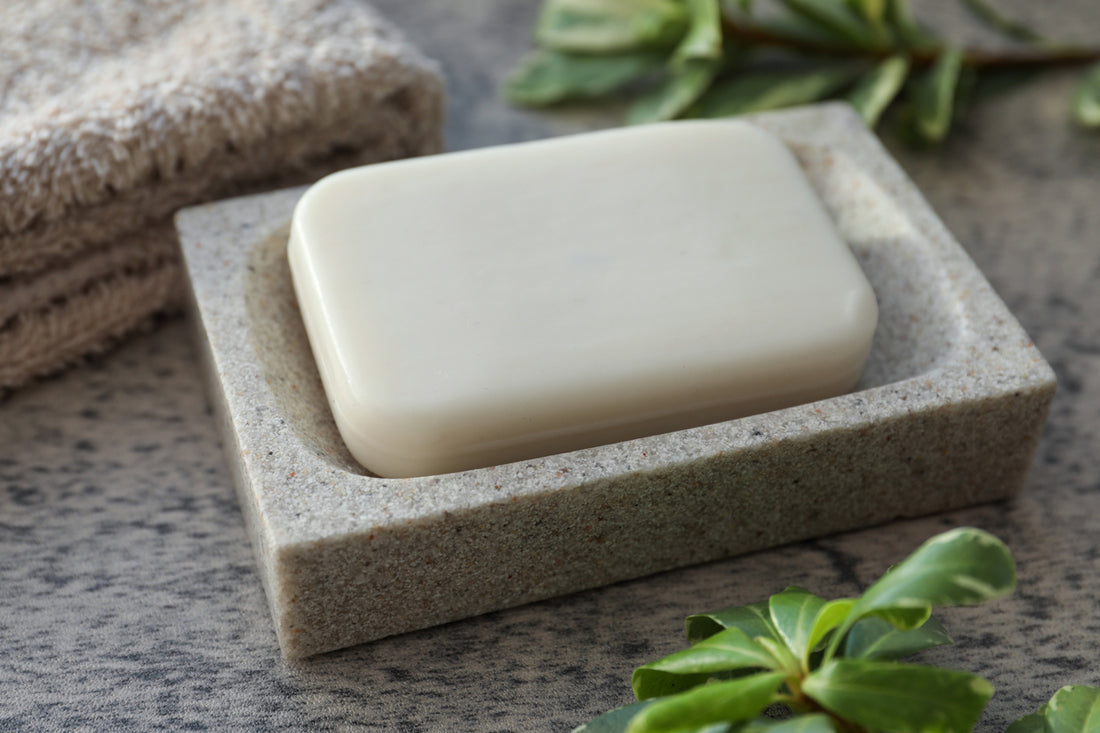Tea tree oil, extracted from the leaves of the Melaleuca alternifolia plant indigenous to Australia, has been highly valued for its healing properties for many years.
This potent essential oil has become widely popular in the realm of skincare because of its multitude of skin benefits.
A prevalent and efficient method of integrating tea tree oil into your skincare regimen is by using tea tree soap.
This comprehensive guide will explore the tea tree soap benefits and advantages of tea tree soap for your skin and explain why it is a preferred choice among skincare aficionados.
Natural Tea Tree Soap
The natural composition of tea tree soap is a key factor that appeals to many individuals. Unlike numerous commercial soaps that contain harsh chemicals and synthetic fragrances, tea tree soap is typically formulated with pure tea tree oil and other natural ingredients. This makes it an ideal choice for those with sensitive or reactive skin who aim to avoid potential irritants.
The combined properties of tea tree oil work together to provide a wide range of benefits for your skin.
Tea Tree Soap for Body Odor
Many individuals struggle with the issue of body odor, which can have a negative impact on their confidence and self-esteem. Luckily, tea tree soap offers an effective solution to combat body odor.
The antibacterial properties of tea tree oil work to eliminate the bacteria that cause unpleasant odors.
By incorporating tea tree soap into your daily shower routine, you can ensure that your body remains fresh and clean throughout the day. Using tea tree soap regularly can make a noticeable difference in addressing body odor..
Tea Tree Soap for Eczema
Eczema, also known as atopic dermatitis, is a chronic skin condition that results in dry, itchy, and inflamed patches on the skin. Many individuals suffering from eczema encounter difficulties in finding suitable skincare products that can provide relief to their irritated skin without causing further discomfort.
Tea tree soap may offer a beneficial solution to their skincare regimen. The anti-inflammatory and antimicrobial properties of tea tree oil can assist in alleviating eczema symptoms, such as redness and itching.
However, it is essential to consult with a dermatologist before using tea tree soap for eczema to ensure its appropriateness for your specific condition.
Tea Tree Soap for Acne
Acne is a common skin issue that impacts individuals of all ages. The remarkable antibacterial and antifungal properties of tea tree oil make tea tree soap an effective solution for those with acne-prone skin.
Consistent use of tea tree soap can effectively diminish the bacteria responsible for acne breakouts, unclog pores, and regulate excessive oil production.
Furthermore, it possesses soothing properties that can alleviate inflammation and redness often associated with acne. By including tea tree soap in your daily skincare regimen, you can enhance the clarity and health of your complexion.
How to Use Tea Tree Soap
To fully enjoy the advantages of tea tree soap, it is crucial to utilize it in the correct manner.
Below, you will find a comprehensive, step-by-step manual on how to effectively integrate tea tree soap into your routine.
skincare regimen:
1. Wet your face or body with lukewarm water.
2. Lather the tea tree soap between your hands or onto a washcloth.
3. Gently massage the lather onto your skin in circular motions.
4. Pay extra attention to areas prone to body odor, acne, or other skin concerns.
5. Rinse thoroughly with lukewarm water and pat dry with a clean towel.
6. Follow up with a moisturizer suitable for your skin type to prevent any dryness.
What Is Tea Tree Soap Good For?
Tea tree soap provides numerous advantages aside from addressing body odor, eczema, and acne.
Here are some extra ways to utilize tea tree soap:
1. Antiseptic properties: Tea tree soap can be used to cleanse minor cuts, scrapes, and insect bites due to its antiseptic qualities. It helps prevent infection and promote faster healing.
2. Foot care: Tea tree soap can be used to cleanse and refresh tired and sweaty feet. Its antibacterial properties help combat foot odor and fungal infections like athlete's foot.
3. Natural deodorant: Due to its refreshing and antibacterial properties, tea tree soap can be used as a natural alternative to conventional deodorants. It helps control body odor without harsh chemicals.
4. Scalp health: Tea tree soap can be beneficial for individuals with dandruff or a dry, itchy scalp.
Utilizing tea tree soap in your haircare routine has the potential to soothe the scalp and alleviate dandruff.
Takeaway message
To conclude, tea tree soap is a versatile and natural skincare option that offers a wide range of benefits for your skin. Whether it's combating body odor, soothing eczema, or treating acne, tea tree soap has become a fundamental component in numerous skincare regimens. Its natural composition, complemented by its antibacterial and anti-inflammatory properties, makes it an excellent choice for individuals seeking effective and gentle skincare solutions. So, why not give tea tree soap a try and witness the remarkable transformations it can bring to your skin?
Find this article helpful? Please Like, Follow and Share @greatermood on all social media platforms.
Also check out our top health and wellness blogs or for other articles on wellness and brighter skin tips to improve your mood and wellness.

